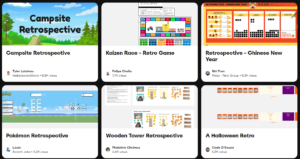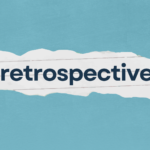Retrospectives are an essential practice for building high-performing teams. Sadly, they are often done poorly – or not at all. These are resources we think you’ll find useful in making your retrospectives more effective.
–Jake Calabrese
1. Our Articles About Agile Retrospectives
- Retrospectives Improve Team Relationships [Article] by Jake Calabrese. A primary benefit of a retrospective is improving the team’s relationship.
- Lessons-Learned vs Project Retrospectives [Article] by Jake Calabrese. Retrospectives and lessons-learned meetings are similar but not the same.
- Bad Standard: Plus-Minus-Delta Agile Retrospectives [Article] by Jake Calabrese. The “standard” form of a retrospective is one that Jake doesn’t like.
- The Real Baseline Agile Retrospective Format [Article] by Jake Calabrese. Six questions to build your retrospectives on.
- Focusing Agile Retrospectives [Article] by Jake Calabrese. What are your retrospectives focused on?
- Why Project Retrospectives Are Challenging [Article] by Jake Calabrese. Key elements to consider when deciding if you want a project retrospective.
- All Retrospective Articles from Helping Improve
2. Other Articles about Agile Retrospectives
- 16 Ways to Explain What an Agile Retrospective Is [Article] by Luis Gonçalves. Need to explain a retrospective to someone who has never experienced one? Luis has you covered.
- Retrospectives In Your Own Sweet Way [Article] by Olga Kouzina. Olga discusses the core concepts of retrospectives, has many real examples, and most importantly talks about the idea that you should experiment and try things. All of the books, articles, and blogs in the world are great, but if you do not try things and learn, you will never get started on the journey.
3. Agile Retrospectives Formats & Activities
- Retrospective Wiki [Website] by Rob Bowley. In his words, “This is a resource for sharing retrospective plans, tips & tricks, tools and ideas to help us get the most out of our retrospectives. Retrospectives play a crucial role in software teams. They are the time specifically put aside to reflect on how the team is performing and what can be done to improve.”
- Fun Retrospectives [Website] by Paulo Caroli and Taiña Caetano. This site catalogs a number of activities including a safety check, other check-ins, the pre-mortem (all things that could go wrong), and other ideas for structuring and focusing your retro. Many of these are scattered around the web (and in some of the books below), so we like having them accessible via the web to get the ideas flowing.
- RetroMat: [Website] by Corinna Baldauf. This site has almost 100 activities in multiple languages. You can also add your own activity.
- Miro Retrospective Templates: [Website] Miro has a ton of retrospective options

Miro Retrospective Templates (there are many more) available that you use as templates.
- Actions Centered Retrospective [Article] by Nick Oostvogels. We like this layout and have used it in a number of situations. He also talks about other retrospective topics.
4. Agile Retrospective Books
- Getting Value Out of Agile Retrospectives [Book] by Ben Linders and Luis Gonçalves. This includes a number of agile retrospective exercise formats as well as a section on the business value of agile retrospectives, steps for pre-work, and more. A great place to get a well rounded overview of retros and a number of exercise ideas.
- The Retrospective Handbook [Book] by Patrick Kua. This book digs into more details surrounding retrospectives. We recommend this book as well for anyone looking to get into more of the reasoning and background beyond retrospectives. (Also available on Amazon.)
- Agile Retrospectives: Making Good Teams Great [Book] by Esther Derby and Diana Larsen. The first and best-known book on agile retros, this book contains a ton of great ideas for retrospectives.
- Fun Retrospectives [Book] by Paulo Caroli and Taiña Caetano. A book by the same folks who run the website above.
- The Remote Facilitator’s Pocket Guide [Book] by Kirsten Clacey and Jay-Allen Morris. Critical tools and techniques facilitating online retrospectives.

